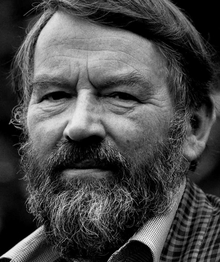John Fowles

John Robert Fowles (31 March 1926 – 5 November 2005) was an English novelist and essayist. In 2008, The Times newspaper named Fowles among their list of "The 50 greatest British writers since 1945".
Teaching career
Fowles spent his early adult life as a teacher. His first year after Oxford was spent at the University of Poitiers. At the end of the year, he received two offers: one from the French department at Winchester, the other "from a ratty school in Greece," Fowles said, "Of course, I went against all the dictates of common sense and took the Greek job."
In 1951, Fowles became an English master at the Anargyrios and Korgialenios School of Spetses on the Peloponnesian island of Spetsai, a critical part of Fowles's life, as the island would be where he met his future wife Elizabeth Christy, née Whitton, wife of fellow teacher Roy Christy, and would later serve as the setting of his novel The Magus. Fowles was happy in Greece, especially outside of the school. He wrote poems that he later published, and became close to his fellow exiles. But during 1953 Fowles and the other masters at the school were all dismissed for trying to institute reforms, and Fowles returned to England.
On the island of Spetsai, Fowles had grown fond of Elizabeth Christy, who was married to one of the other teachers. Christy's marriage was already ending because of the relationship with Fowles, and though they returned to England at the same time, they were no longer in each other's company. It was during this period that Fowles began drafting The Magus. His separation from Elizabeth did not last long. On 2 April 1954, they were married and Fowles became stepfather to Elizabeth's daughter from her first marriage, Anna. After his marriage, Fowles taught English as a foreign language to students from other countries for nearly ten years at St. Godric's College, an all-girls in Hampstead, London.
Literary career
In late 1960, though he had already drafted The Magus, Fowles began working on The Collector. He finished his first draft in a month, but spent more than a year making revisions before showing it to his agent. Michael S. Howard, the publisher at Jonathan Cape was enthusiastic about the manuscript. The book was published in 1963 and when the paperback rights were sold in the spring of that year it was "probably the highest price that had hitherto been paid for a first novel," according to Howard. British reviewers found the novel to be merely an innovative thriller, but several American critics detected a serious promotion of existentialist thought.
The success of his novel meant that Fowles was able to stop teaching and devote himself full-time to a literary career. The Collector was also optioned and became a film in 1965. Against the counsel of his publisher, Fowles insisted that his second book published be The Aristos, a non-fiction collection of philosophy. Afterward, he set about collating all the drafts he had written of what would become his most studied work, The Magus, based in part on his experiences in Greece.
In 1965 Fowles left London, moving to a farm, Underhill, in Dorset, where the isolated farm house became the model for The Dairy in the book Fowles was then writing, The French Lieutenant's Woman (1969). The farm was too remote, "total solitude gets a bit monotonous," Fowles remarked, and in 1968 he and his wife moved to Lyme Regis in Dorset, where he lived in Belmont House, also used as a setting for parts of The French Lieutenant's Woman. In the same year, he adapted The Magus for cinema.
The film version of The Magus (1968) was generally considered awful; when Woody Allen was asked whether he'd make changes in his life if he had the opportunity to do it all over again, he jokingly replied he'd do "everything exactly the same, with the exception of watching The Magus." The French Lieutenant's Woman was made into a film in 1981 with a screenplay by the British playwright Harold Pinter and was nominated for an Oscar.
Fowles lived the rest of his life in Lyme Regis. His works The Ebony Tower (1974), Daniel Martin (1977), Mantissa (1981), and A Maggot (1985) were all written from Belmont House. Fowles became a member of the Lyme Regis community, serving as the curator of the Lyme Regis Museum from 1979–1988, retiring from the museum after having a mild stroke. Fowles was involved occasionally in politics in Lyme Regis, and occasionally wrote letters to the editor advocating preservation. Despite this involvement, he was generally considered reclusive.[12] In 1998, he was quoted in the New York Times Book Review as saying, "Being an atheist is a matter not of moral choice, but of human obligation."
His first wife Elizabeth died in 1990. With his second wife Sarah by his side, Fowles died 5 miles from Lyme Regis in Axminster Hospital on 5 November 2005.
Borrowed from http://en.wikipedia.org










